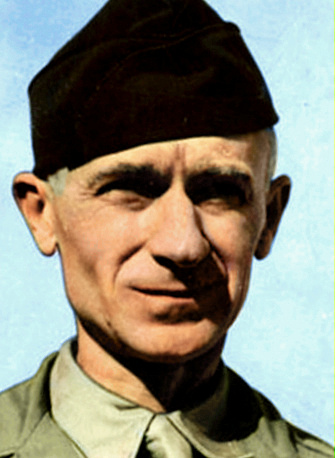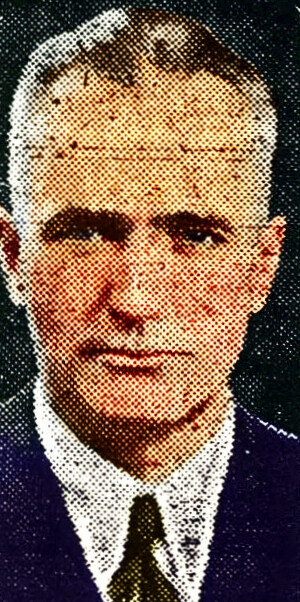Background of news –
San Francisco Conference
By Bertram Benedict
…
San Francisco meeting planned
By Ethel Bogardus
…
…
Servicemen likely to challenge wives’ matter-of-fact statements
By Ruth Millett
…
Two-year program urged if necessary
By George Gallup, Director, American Institute of Public Opinion
…
…

By Ernie Pyle
Before he was killed on Ie Shima, Ernie Pyle, as was his habit, had written a number of columns ahead. He did this so there would be no interruptions in the column while he was getting material for more. Several more are expected.
OKINAWA (by Navy radio) – One of these days Mrs. Leland Taylor of Jackson, Michigan, is going to be the envy of all her friends. For she is about to come into possession of four pairs of the most beautiful Japanese pajamas you ever saw.
These are daytime pajamas or drawing room pajamas – the kind that some American hostesses wear at cozy cocktail parties.
Mrs. Taylor’s husband, who is a Marine corporal and known as “Pop,” found these pajamas in a wicker basket hidden in a cave. They are thrilling to look at and soft to the touch.
Pop carries the basket around on his arm from place to place until he can get a chance to ship them home.
![]()
One morning I wandered down to our mortar platoon and ran onto a young fellow with whom I have a great deal in common. We are both from Albuquerque and we both have mosquito trouble.
This New Mexico lad was Pfc. Dick Trauth. Both his eyes were swollen almost shut from mosquito bites. At least one of mine is swollen shut every morning. We both look very funny.
Dick still is Just a boy. He’s seen 19 months in the Marines and a year overseas. He’s a veteran of combat and still he’s only 17 years old. He has one brother in the Marines and another in the Army in Germany.
Bing Crosby of the Marines
Dick writes letters to movie stars and not long ago he got back a picture of Shirley Temple, autographed to his company just as ne had asked her to do. Dick is very shy and quiet and I had a feeling he musty be terribly lonesome but the other boys say he isn’t and that he gets along fine.
![]()
One of the Marines who drives me around in a jeep whenever I have to go anywhere is Pfc. Buzz Vitere of the Bronx.
Buzz has other accomplishments besides jeep driving. He is known as the Bing Crosby of the Marines. If you shut your eyes and don’t listen very hard you can hardly tell the difference.
I first met Buzz on the transport coming up to Okinawa. He and a friend would give an impromptu and homegrown concert on deck every afternoon.
They would sit on a hatch in the warm tropical sun and pretty soon there would be scores of Marines and sailors packed around them, listening in appreciative silence. It made the trip to war almost like a Caribbean luxury cruise.
Buzz’s partner was Pfc. Johnny Marturello of Des Moines, Iowa. Johnny plays the accordion. He is an Italian, of course, and has all an Italian’s flair for the accordion. He sings too, but he says as a singer his name is “Frank Not-So-Hotra.”
Johnny plays one piece he composed himself. It is a lovely thing. He sent it to the G.I. Publishing Company, or branch or whatever it is in the States and I feel positive if it could be widely played it would become a hit.
Tropics hard on accordion
The piece is a sentimental song called “Why Do I Have to Be Here Alone?” Johnny wrote it for his girl back home, but he grins and admits they are “on the outs.”
Johnny came ashore on Love Day and his accordion followed two days after. Now in his off moments, he sits at the side of the road and plays for bunches of Okinawans that the Marines have rounded up. They seem to like it.
Johnny had a lot of trouble with his accordion down south in the tropical climates. Parts would warp and stick and mold and he continuously had to take the thing apart and dry and clean it.
But it was worth the trouble. It has kept Johnny from getting too homesick. He brought it along with him from America just for his own morale. He knew the accordion would probably be ruined by the climate, but he didn’t care.
“I can always get a new accordion,” Johnny said, “but I can’t get a new me.”

By Maj. Al Williams
The passing of Ernie Pyle recalls many memories of years ago.
When I first met Ernie, he was the aviation editor of The Washington News. Aviation news of those days largely was confined to the progress of feuding between the Army and Navy, with a dash of commercial aviation – such as it was.
Every service airman stationed in Washington knew Ernie. The unassuming little guy with the pleasant smile got around and everybody called him Ernie. He wrote his flying news so that lay folks could understand it. Some of us came to know Ernie mighty well. We were in the thick of a losing fight to awaken the country to what we thought we saw coming in the form of airpower. And to do this we had to attack deeply-entrenched traditional prejudices.
It was Ernie who often dropped a wise word of caution which saved a few lads I know from officially breaking their precious necks. It was Ernie who sat next to me and covered my congressional fight – and I still preserve a copy of what Ernie had to say about that battle for high-speed research so that we would know how to build high-speed fighters when we needed them.
Caught the significance
Ernie quickly caught the technical significance of an aviation story, but, as so highly developed in his later writings, he probed with the delicate touch of a sensitive instinct until he found the deep, underlying stream of warm human-interest factors. And then – Pyle fashion – he told his story as only he could tell it. Furthermore, Ernie never became greater than the men he wrote about, and in this critical angle differed from the usual run of air writers.
There’s been a deepening public nostalgia in this land for reality, for the warm homey fundamentals of old-fashioned Americanism. And nowhere was this nostalgia more evident than in the popular turning of everyday, ordinary people to Ernie’s daily column.
I remember the first time I took Ernie as a passenger in a Navy two-seater fighter, his cool smile as I lashed him up in his parachute and his remark as I passed along a few directions as to what to do with that chute ring – when, as, and if–
Admitted he was scared
This little, frail guy had a great soul deep down inside, and a heart to take whatever came his way. Ernie just sat there, keenly alert, seeing everything, registering everything. Scared – as he told me later. Sure, he came right out with the confession.
With these memories of the Ernie Pyle of other days I have never been surprised at his understanding of our boys’ real thoughts and his ability to tell the story so everyone could understand it.
We are all designed according to the same general plan – the same number of bones, the same aches and the same wants. The big, distinguishing difference is in the intensity of that little light way down deep inside which we call a soul. In some it burns dimly. In others it flares once in a while. In still others it burns very brightly at times. But in some, it is incandescent, burning its owner as well as those nearby with an unquenchable determination to live fully and completely. Such a light illuminated the life of Ernie Pyle, best exemplified to me by his words years ago as I buckled on his parachute:
“Maybe I can’t take it, Al, but fly this flight as if I weren’t with you.”
War years bring only slight increase
By S. Burton Heath
…
Services, Congress take 4 major steps
…
Backers say all they got from election was pleasure of seeing job well done
By Frances Burns
…
By Gracie Allen
SAN FRANCISCO – Well, here I am in San Francisco where the most brilliant minds of our time are gathered for the world security conference.
I told my editor that I don’t belong here but he said he was sending me to get “color.” That shows how much he knows – it’s so foggy I haven’t got one bit of color.
My goodness, this city simply is teeming with delegates from all over the world. No matter where you turn, you bump into a Russian. It’s just like being in Berlin.
There’s been talk of a food shortage so maybe it’s fortunate the Russians sent that shipload of caviar and vodka. I can just picture all the delegates down on the docks, standing in a caviar-and-vodka line. Probably much nicer than a bread line.
Senator is unanimous selection over more than 100 candidates
…
…
12 litres of what? Food? Blood?
Twelve stretchers. It’s spelled “litters,” not “liters.”
Oh…
I forgot Americans don’t use the metric system.